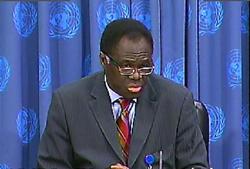UNSC September agenda does not include Bashir’s ICC indictment
September 3, 2008 (UNITED NATIONS) – The UN Security Council (UNSC) received no request from any of its members to take up the issue of the International Criminal Court (ICC) seek an arrest warrant for Sudanese president Omer Hassan Al-Bashir.

Kafando briefed reporters at the UN today on programme of work for the UNSC in his capacity as the council’s president for the month of September.
The announcement may come as a disappointment to Khartoum which had hoped that its allies at the UNSC would press for a resolution deferring ICC prosecution of Al-Bashir.
In mid-July the ICC’s prosecutor Luis Moreno-Ocampo asked pre-trial judges to issue arrest warrants for the Sudanese president on charges of war crimes and genocide. The ICC judges have yet to make a decision which could take a few more months.
The African Union, Arab League, Non-Aligned Movement (NAM) and Organization of Islamic Conference (OIC) called for invoking Article 16 which allows the UNSC to suspend the ICC prosecutions in any case for a period of 12 months that can be renewed indefinitely.
Libya and South Africa sought to force a suspension in the UNAMID extension resolution adopted on July 31st but failed to get the required number of votes and instead accepted a watered down paragraph taking note of the African Union (AU) concern regarding the ICC move.
Following that the Sudanese government dispatched its envoys for a number of countries including UNSC members such as Libya, South Africa, and Burkina Faso seeking a resolution freeze ICC prosecutions in Darfur.
Sudanese officials have also expressed confidence lately that China and Russia will use their veto power to freeze Al-Bashir arrest warrant.
This week the headline news of the Al-Rae’d daily newspaper, issued by the ruling National Congress Party (NCP), came under “Chinese veto awaits Ocampo”.
However the UNSC does not have the power to veto an arrest warrant issued by the ICC. China has reportedly informed Sudan not to rely on its ‘veto’ and instead focus on reaching a negotiated settlement in Darfur.
Hopes for the introduction of an Article 16 resolution appear to be fading primarily due to the stances of the veto wielding Western members of the UNSC namely US, UK and France.
UK and France diplomats hinted to their desire to see concessions from Sudan before they would consider supporting such a resolution.
But the US, which had long standing opposition to the ICC, appeared uncompromising on bringing war crimes perpetrators to justice. Washington abstained from voting on the UNAMID extension resolution over the text which included reference to the AU concern over Bashir’s indictment.
In explaining the abstention US deputy Representative to the UN Alejandro Wolff said his government strongly supports UNAMID but that the “language added to the resolution would send the wrong signal to the Sudanese president Omar Hassan Al-Bashir and undermine efforts to bring him and others to justice”.
“The issue before us is to make clear to those who are guilty of criminal activity and complicit in the horrors that befallen on the people of Darfur that there can be no escape…anything that signals a way out or any easy way to circumvent that we believe need to be opposed” the US diplomat said.
He also said that the US “disagrees” with the AU request to block the ICC’s prosecutor request of an arrest warrant against Sudan president.
Sudan has not ratified the Rome Statue, but the UNSC triggered the provisions under the Statue that enables it to refer situations in non-State parties to the world court if it deems that it is a threat to international peace and security.
(ST)
